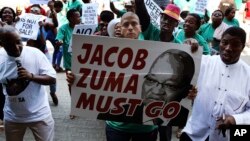Public pressure is mounting on South African President Jacob Zuma to resign, with a parliamentary no-confidence vote set for April 18. But in recent days some of Zuma’s most influential critics within the ruling African National Congress have rallied to support him, and the party that has dominated South African politics since 1994.
The perplexing reversal, analysts say, may not indicate the powerful party has changed its stance on the unpopular president. Instead, they say, it may mean the party is trying rally before growing opposition and public protests against Zuma over a litany of long-simmering corruption scandals and outrage about last week’s controversial Cabinet reorganization shuffle.
“We will not vote against the ANC,” secretary-general Gwede Mantashe said Wednesday, just days after he publicly blasted Zuma for ousting several respected ministers who had openly challenged him. “... No army respecting itself allows its foot soldiers to be commanded by an enemy army general. Nowhere in the world.”
With those words, Mantashe drew a line in the sand in the upcoming parliamentary battle over whether to force Zuma to resign, and called the entire ANC, which holds a parliamentary majority, to Zuma’s side. Analysts say the party will tell its parliamentary members to attend the vote and support Zuma or face possible expulsion from the party, which would deprive them of their seat and salary.
Battle between party lines
But the ruling party may not be as unified as it looks, analysts say.
“What appears to be going on is that there’s an internal battle within the ANC for both the political, policy and ideological heart of the party,” political analyst Ebrahim Fakir told VOA.
He said, “... what has happened in the last two days, dramatically, was that even those in the leadership of the ANC who accused [Zuma] of facilitating this kind of factionalism were decidedly in retreat, not necessarily apologizing, but apologizing for the fact that they made their disagreements public.”
Zuma has also lost major outside support. In recent days, two powerful groups that have long been allies of the ANC, the Communist party and the nation’s largest trade union, called for Zuma to resign.
This turmoil has badly impacted the rand and also triggered major ratings agency S&P Global to downgrade South Africa’s credit rating to “junk” status.
A temporary reprieve?
Fakir said Zuma’s likely escape from a no-confidence vote may just be a temporary reprieve.
The ANC prefers to hash out their disagreements privately, and he predicts the party will replace Zuma as ANC leader in December when they hold their next major conference, and then ask Zuma to resign and put in a caretaker president until elections in 2019.
Those moves should be familiar to Zuma, that is how he became party president, and subsequently president, when the ANC brought him in to replace President Thabo Mbeki as ANC leader in 2008.
“In this battle to dislodge Jacob Zuma, the most effective way, particularly between a national election year, is for the party itself is to recall him, or to prevail upon him to resign. And this is where the debate is currently headed,” Fakir said.
In Zuma's head
And what of the man in the middle of this maelstrom?
Zuma’s recent schedule has kept him clear of loaded political events. He declined to attend a funeral of an anti-apartheid icon who had publicly called for him to resign. His recent speeches, several of them delivered at events in his rural strongholds, have focused on the importance of economic development and good governance, but avoided any mention of the president’s predicament.
In recent days, VOA has repeatedly called Zuma’s spokesman seeking insight into his thoughts on his position, but his spokesman did not comment.




